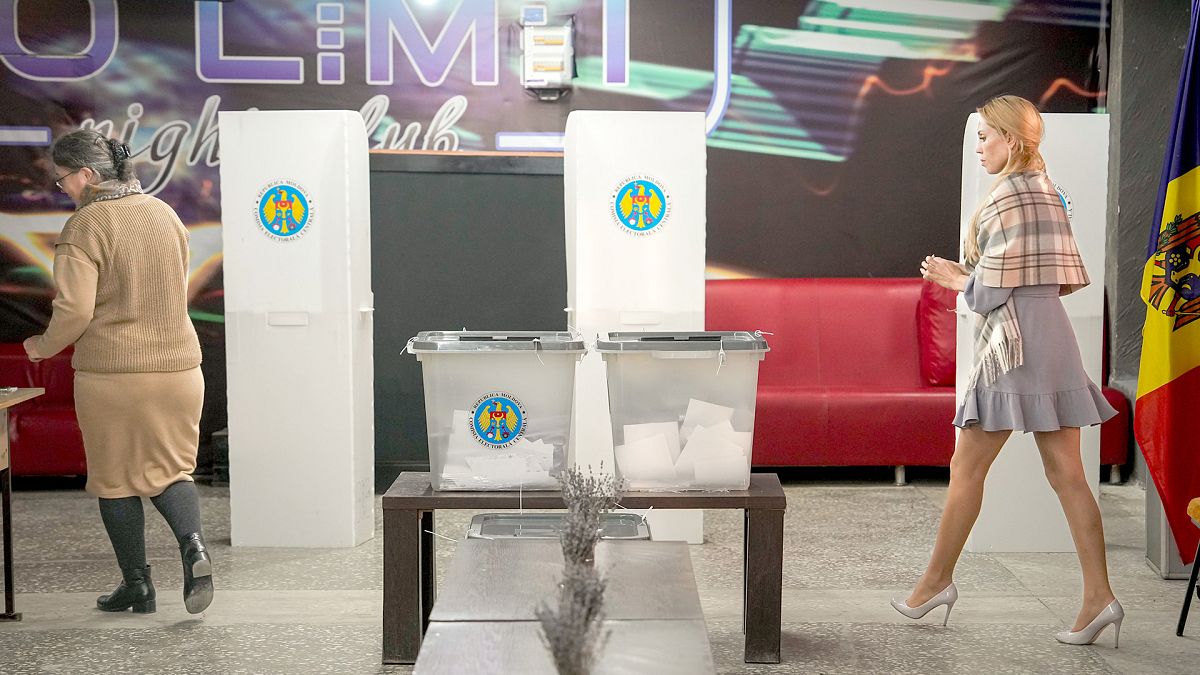Sandu and Stoianoglo face off in crucial Moldova presidential runoff

Moldovan voters to choose between pro-European incumbent Maia Sandu and challenger Aleksandr Stoianoglo, who favours closer ties with Russia.
While much of Europe is focused on the final week of the razor-thin race for the White House, another significant presidential election is unfolding closer to home in Moldova.
Moldova’s election runoff on Sunday is between Maia Sandu, the pro-Western incumbent who has pushed strongly for greater EU integration, and Alexandr Stoianoglo, a Russia-friendly former chief prosecutor seeking closer ties with Moscow.
The first round of the presidential race in the country of 3 million was held on 20 October alongside a referendum on EU membership.
A tiny majority of 50.46% voted in favour of adding a clause to the Moldovan constitution defining EU membership as a goal. Earlier opinion polls had put Moldovans’ support for EU membership at around 60%.
The vote, which some analysts saw as a referendum on Sandu’s premiership, was marred by allegations of Russian interference, including vote-buying. In the aftermath, the Moldovan president tweeted: “We fought fairly in an unfair fight — and we won.”
The European Commission and the White House have warned about Russian meddling in Moldovan politics in the wake of the referendum and ahead of the runoff.
In the first round of the presidential election, Sandu topped the poll with 42% of votes cast, followed by Stoianoglo with 26%. To win outright, 50% of the votes was required.
Both candidates outperformed their polling averages, with Stoianoglo gaining almost triple what polls had predicted. Sandu is backed by the centre-right and pro-EU Party of Action and Solidarity (PAS), while Stoianoglo has the support of the pro-Kremlin Socialist Party (PRSM).
Drifting east?
A total of 11 candidates contested the first round, which had a 51% turnout. Although Sandu gained the most votes of any candidate, pro-European politicians won less than 50% of ballots cast overall, with 650,000.
Meanwhile, candidates who spoke in favour of Russia or asserted their independence received a total of 850,000 votes.
Analysts suggested that reports of Russian interference should not distract from the fact that Moldovan voters have expressed widespread frustrations with Sandu. Her four-year term has included the COVID-19 pandemic and its aftermath, as well as Russia’s full-scale invasion of neighbouring Ukraine.
These factors led to a major economic fallout in Moldova, which saw its economy contract following the invasion, and inflation reached a high of almost 35%. Sandu’s disapproval rating remains much higher than her rival’s.
This Sunday’s runoff will be closely watched in Brussels following last week’s election in Georgia, another former Soviet country with aspirations of joining the EU.
A bitter spat is ongoing in Georgia between the pro-European President Salome Zourabichvili and the ruling Georgia Dream (GD) government over alleged Kremlin interference in last weekend’s parliamentary elections, in which GD claimed victory.
The vote was seen by many Georgians as a choice between continuing to support the GD or seeking closer integration with the EU.
The final countdown
As the Moldovan runoff race enters its final few days, both candidates are frantically making their pitches to the electorate, with many voters still undecided.
Sandu is trying to reach across the aisle, and appeal to some more Russophile voters.
In a video released online, she accused Russia of promoting Stoianoglo over other politically aligned candidates, saying: “If votes were not stolen, Renato Usatîi would have been my opponent,” mentioning another pro-Moscow candidate. Sandu concluded by stating: “Let’s join forces.”
Stoianoglo has been trying to walk a political tightrope, presenting himself as both pro-European, but also open to closer ties with Moscow. However, in the final week of campaigning, he has tended towards the latter.
Speaking to local pro-Kremlin, Russian-language press, he stated that he “didn’t see any difference between the attitude towards the elections” of Russia and the EU, before adding: “I would even say that [the EU] had a more aggressive policy”.
In the same interview, Stoianoglo also took aim at NGOs, calling them “vassals of the current government” and questioning foreign funding.
His comments are similar to those of leaders in Georgia, who introduced a “foreign agents” bill similar to the one in Russia, labelling NGOs with foreign funding as pursuing the interests of a foreign power.
During a heated TV debate on Sunday, Sandu also accused Stoianoglo of corruption over his decision as chief prosecutor in 2020 to suspend the 18-year prison sentence of businessman Veaceslav Platon for fraud and money laundering.
Stoianoglo was alleged to have a long-term friendship with Platon, which caused a scandal at the time and led to Sandu firing him from his position as chief prosecutor. Stoianoglo denies the allegations.
EU leaders are concerned with the fairness of Sunday’s vote and are pushing for greater transparency. Observers of Moldovan politics believe that purported Russian interference could damage Moldova’s chances of EU accession, even if Sandu wins.
In a last-ditch attempt to push for fair elections, Sandu appealed directly to the county’s local mayors in a televised address. “Only together, only if each mayor mobilises their community, can we save the Republic of Moldova,” she said.
World News || Latest News || U.S. News
Source link



